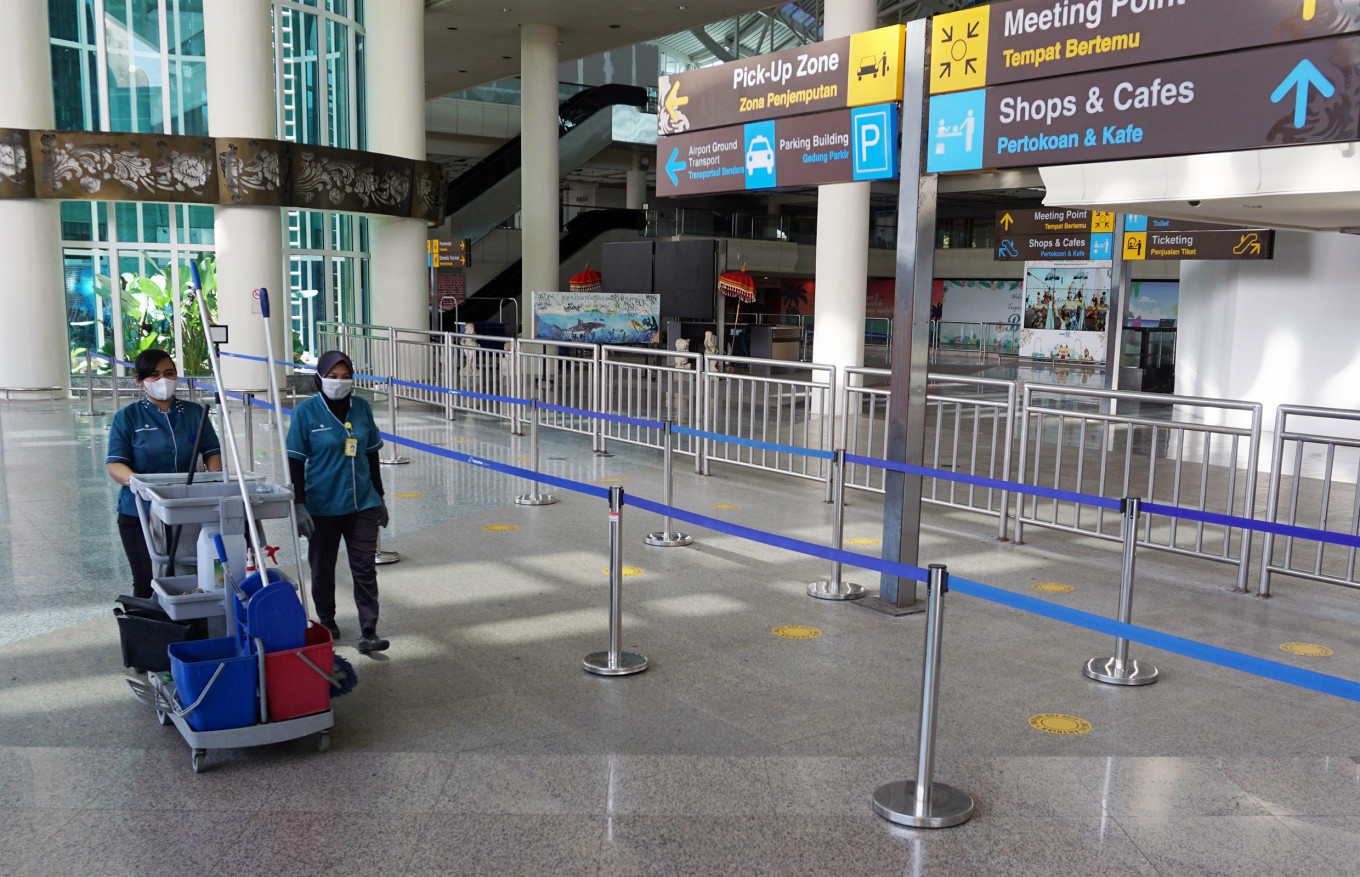Popular Reads
Top Results
Can't find what you're looking for?
View all search resultsPopular Reads
Top Results
Can't find what you're looking for?
View all search resultsRI imposes travel ban over Omicron
Genome sequencing key to controlling threat
Change text size
Gift Premium Articles
to Anyone
I
ndonesia has joined a growing list of countries tightening their borders amid the looming threat of the new Omicron COVID-19 variant, but experts say travel bans will only delay the inevitable arrival of this variant.
The B.1.1.529 variant was first reported to the World Health Organization from South Africa on Wednesday, then was officially listed as a WHO Variant of Concern (VOC) on Friday under the name Omicron, which is suspected of driving a spike in new infections in South Africa.
Little is known about Omicron, but scientists fear it has mutations that could make it more infectious and might render certain COVID-19 treatments and immune defenses — either from vaccines or prior infections — less effective.
It has been detected in at least seven other countries or territories ever since, including Australia, the United Kingdom, Germany, Israel, Italy, Belgium and Hong Kong, according to various media reports.
Dozens of countries, from the UK to Indonesia's neighbors Singapore, Malaysia and Thailand have previously either banned or restricted travelers from countries in southern parts of Africa or considered doing so to prevent Omicron from entering their borders.
On Sunday, Indonesia placed a travel ban on foreigners with a history of being in South Africa, Botswana, Namibia, Zimbabwe, Lesotho, Mozambique, Eswatini, Malawi, Angola, Zambia and Hong Kong within two weeks before departing to Indonesia. Meanwhile, Indonesian citizens who have visited these countries will have to go through a 14-day quarantine period upon returning home.
Coordinating Maritime Affairs and Investment Minister Luhut Binsar Pandjaitan said this would be effective indefinitely starting on Monday, depending on how the situation would develop.
Other countries that have reported Omicron cases, such as Australia, Germany and Italy, remain excluded from the travel ban, the government said, as they had been able to isolate their Omicron cases through mandatory quarantine, preventing it from spreading among local communities.
Indonesia also increased its mandatory quarantine period across the board, even for arrivals from countries without any traces of the Omicron variant, up to seven days from the prior three-to-five-day quarantine rule.
“The public does not need to panic. The government is already taking steps, such as tightening our borders, and we will also be increasing our genome sequencing, particularly on people arriving from overseas, in order to detect the Omicron variant,” Luhut said.
Read also: Genome surveillance another weak link in Indonesia's coronavirus fight, experts warn
Luhut said the government was also looking to ramp up vaccinations for the elderly, as this age group is at a higher risk of infection.
Delaying the inevitable
Griffith University epidemiologist Dicky Budiman said a travel ban would "only delay" the inevitable arrival of this variant, which he believed had the potential "to trigger new outbreaks across the world and a third wave of infections in Indonesia".
Dicky said that according to research on genomic data in South Africa, the Omicron variant was 500 times more contagious than the coronavirus initially found in Wuhan, China. The Delta variant was only around 100 times more contagious than the original Wuhan strain.
Read also: What is known so far about new COVID-19 variant Omicron
He urged the government to improve its COVID-19 surveillance, including through polymerase chain reaction (PCR) testing, whole-genome sequencing and the vaccination rate, as vaccines could protect against the most severe effects of COVID-19.
Any immediate discovery of the new variant, he said, could determine the steps the government must take in containing the outbreak.
“Genome sequencing will be key to controlling the threat of the new variant. If Indonesia can increase its capacity, it will be in a better position to prevent [a third wave],” Dicky said.
Doubts over genome sequencing capacity
Experts have repeatedly voiced their concerns about Indonesia's insufficient whole-genome sequencing to detect new variants. The South African variant, for instance, was only reported in May even though the patient had been treated since January.
Read also: New variants expose loopholes in contact tracing
Over 280,000 sequences have been uploaded to the GISAID online database for sharing viral genomes, with specimens collected in the past 30 days.
Indonesia contributed to a tiny fraction of global submissions, with 10 complete genomes since Oct. 29, or about 0.07 percent of the COVID-19 cases reported in the country in the same period.
This is smaller than those of neighboring countries, like Australia's 1,882 sequences, or 4.51 percent of its reported cases — with two samples collected on Saturday turning out to be Omicron — and Singapore's 857 sequences, or about 1 percent of its reported cases.
“Although genome sequencing is not a way to prevent the new Variants of Concern, it is important to truly determine whether or not the [Omicron] variant is already in Indonesia," said Masdalina Pane of the Indonesian Epidemiologists Association (PAEI). (ipa)










